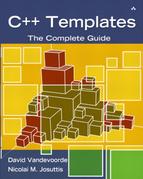Book Description
Templates are among the most powerful features of C++, but they are too often neglected, misunderstood, and misused. C++ Templates: The Complete Guide provides software architects and engineers with a clear understanding of why, when, and how to use templates to build and maintain cleaner, faster, and smarter software more efficiently.
C++ Templates begins with an insightful tutorial on basic concepts and language features. The remainder of the book serves as a comprehensive reference, focusing first on language details, then on a wide range of coding techniques, and finally on advanced applications for templates. Examples used throughout the book illustrate abstract concepts and demonstrate best practices.
Readers learn
The exact behaviors of templates
How to avoid the pitfalls associated with templates
Idioms and techniques, from the basic to the previously undocumented
How to reuse source code without threatening performance or safety
How to increase the efficiency of C++ programs
How to produce more flexible and maintainable software
This practical guide shows programmers how to exploit the full power of the template features in C++.
The companion Web site at http://www.josuttis.com/tmplbook/ contains sample code and additional updates.
0201734842B09172002
Table of Contents
- Title Page
- Copyright Page
- Contents
- Preface
- Acknowledgments
- Chapter 1. About This Book
- Part I. The Basics
- Part II. Templates in Depth
- Part III. Templates and Design
- Part IV. Advanced Applications
- Appendix A. The One-Definition Rule
- Appendix B. Overload Resolution
- Bibliography
- Glossary
- Index
- Footnotes
